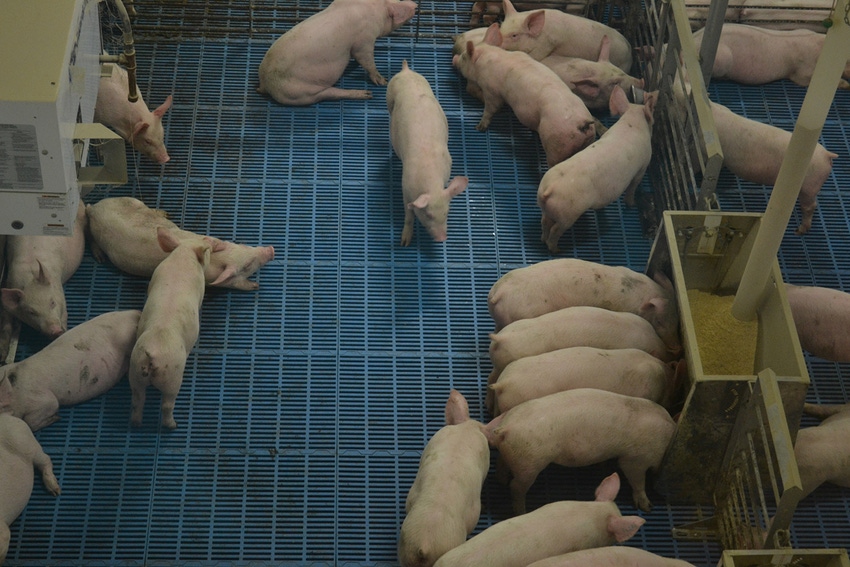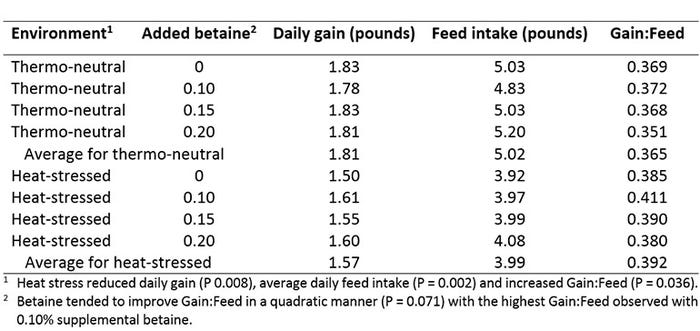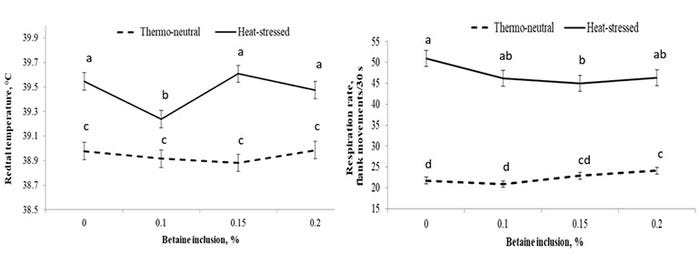Supplementation of betaine alleviated heat stress by improving feed efficiency and reducing rectal temperature.
April 12, 2018

By Eric van Heugten and Santa Maria Mendoza, North Carolina State University Department of Animal Science, and R. Dean Boyd, Hanor Co. Inc., Franklin, Ky.
High ambient temperatures cause significant financial losses for swine producers because heat-stressed pigs have increased mortality, and reduced growth rates, feed efficiency, market weight and carcass value. During heat stress, pigs adapt by increasing blood flow to the skin as a way to cool down, which is compensated by a reduction in blood flow to the digestive organs, reducing their access to nutrients and oxygen. This will ultimately lead to a depletion of energy, increased oxidative stress and damage to cell membranes, affecting digestion and barrier function.
We conducted studies to evaluate the potential of dietary betaine supplementation as a method to reduce the negative impact of heat stress in pigs. Betaine is a methyl donor, which is important in many biological functions and it is also an osmolyte, helping to maintain cell volume and fluid balance. Betaine has been shown to have positive effects in heat-stressed rats, poultry and rabbits. In pigs, betaine improved performance of pigs fed low-energy diets because it reduced the energy requirements for maintenance.
We conducted a study with 64 individually housed pigs (body weight of 86 pounds) to evaluate the impact of dietary betaine on pig performance, core body temperature and respiration rate, and serological and hematological indices during thermo-neutral and heat-stressed conditions. Treatments consisted of two environmental conditions (thermo-neutral or heat-stressed) and four levels of betaine (zero, 0.10, 0.15 and 0.20%). Experimental diets were fed before heat treatments were started for a period of seven days. The room temperature during this initial period was set constant at 21 degrees C (Day -7 to Day 0). This was followed by the implementation of the two thermal environment treatments starting on Day zero and continued for 28 days. Mean average room temperatures during the heat stress period were 19.3 degrees C and 31.0 degrees C for the thermo-neutral and heat-stressed rooms, respectively. Pig body weight and feed intake were measured on Days -7, 0, 14 and 28. Rectal temperature and respiration rate were measured on Days 0, 1, 2, 3, 7, 14, 21 and 28, between 1400 and 1700 hour. Blood samples were collected on Day 3 and 28 for serum chemistry measurements and complete blood count.
Heat stress markedly reduced pig growth performance (Table 1) as evidenced by a 21% reduction in feed intake and a 14% reduction in average daily gain. Gain:Feed was increased by 7%, which may be related to reduced activity of pigs housed under heat-stressed conditions.

Table 1: Effects of ambient temperature and dietary betaine on growth performance of pigs
Heat stress increased respiration rate (average of 48 versus 23 breaths per 30 seconds for the 28-day heat stress period for heat-stressed and control pigs, respectively) and increased rectal temperature (39.5 versus 38.9 degrees C for the overall heat stress period). Heat-stressed pigs gradually adapted to high environmental temperatures (Figures 1 and 2). Measurements of rectal temperature and respiration rate suggested that the peak of heat stress occurred on Day 1.

Figure 1: Effect of environmental temperature and day of exposure on rectal temperature and respiration rate measured on Days 1, 2, 3, 7, 14, 21 and 28. Means with different superscript letters differ (P ≤ 0.05). Exposure to heat stress increased rectal temperature and respiration rate, especially early during exposure and then decreased (P ≤ 0.001) as time progressed.

Figure 2: Effect of environmental temperature and betaine supplementation on rectal temperature and respiration rate. Betaine supplementation reduced rectal temperature of heat-stressed pigs when supplemented at 0.10%. Betaine did not affect pigs housed under thermo-neutral conditions. Betaine supplementation increased respiration rate in pigs housed in the thermo-neutral environment. Betaine reduced respiration rate of pigs housed in the heat-stressed environment.
Heat stress disrupted serum sodium and potassium balance, especially during the first days of heat stress. Heat-stressed pigs did not demonstrate major organ injury, with the possible exception of cardiac and skeletal muscle during the acute phase of heat stress (as evidenced by a marked increase in the serum activity of creatine phosphokinase on Day 3 of heat exposure).
Supplementation of betaine alleviated heat stress by improving feed efficiency and reducing rectal temperature. The osmo-protectant capacity of betaine was supported by amending ion balance and preventing cardiac and skeletal muscle injury during the initial days of heat exposure. Therefore, supplementation of betaine had a minor impact on alleviating heat stress with the possible exception of early days of heat exposure, which is in contrast to the benefits of betaine reported in studies with growing rabbits and poultry.
This work was published in full form with the title “Effects of dietary supplementation of the osmolyte betaine on growing pig performance and serological and hematological indices during thermoneutral and heat-stressed conditions” in the Journal of Animal Science, volume 95, issue 11, pages 5,040-5,053. Funding for this research was provided by the National Pork Board.
You May Also Like



